Yorgos Lanthimos’s Movies Are Weird, Violent, and Disturbingly Funny. What's It Like to Be in One?
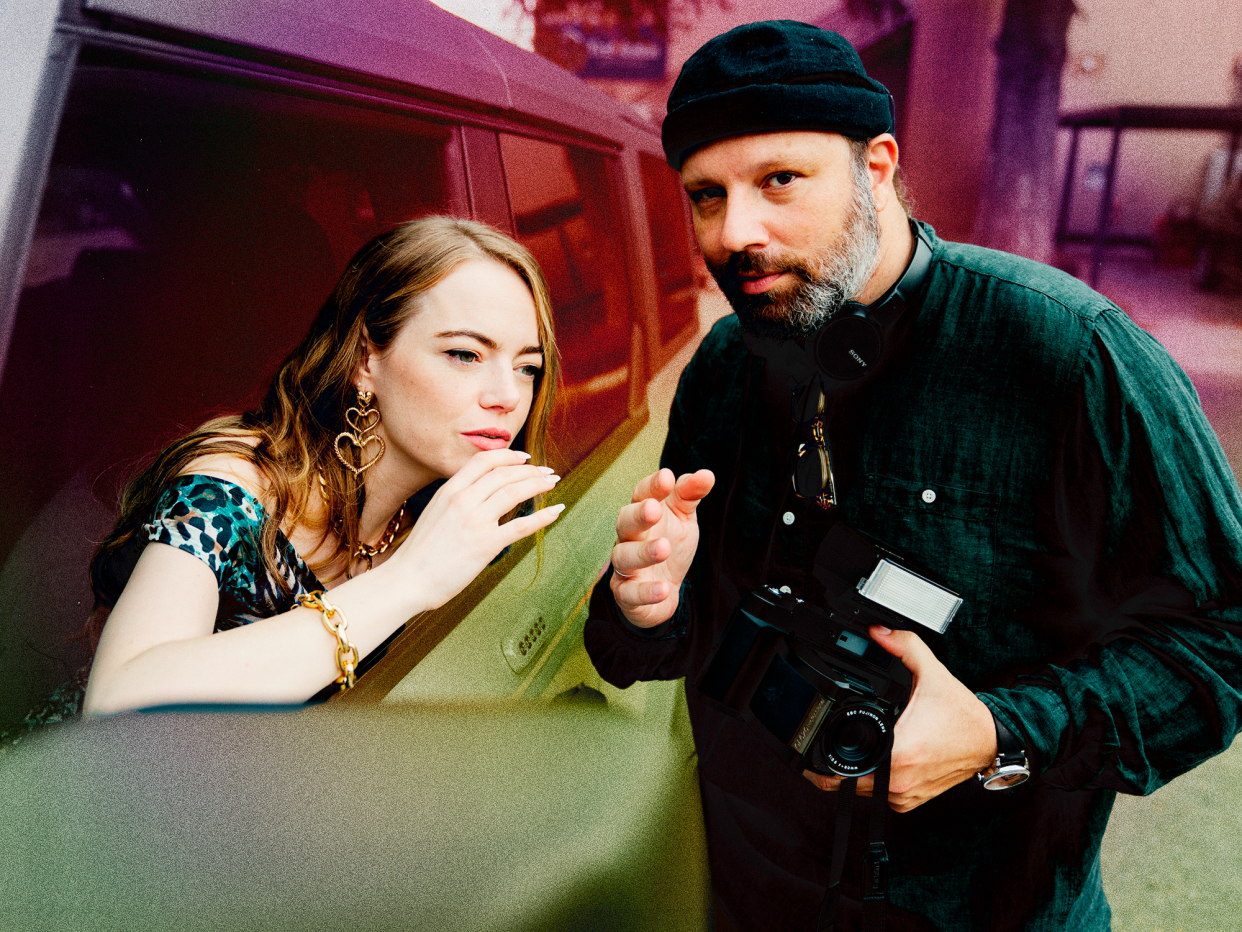
- Oops!Something went wrong.Please try again later.
- Oops!Something went wrong.Please try again later.
- Oops!Something went wrong.Please try again later.
- Oops!Something went wrong.Please try again later.
- Oops!Something went wrong.Please try again later.
Searchlight Pictures; Gabe Conte
Over the past decade or so Yorgos Lanthimos has gone from being a cool Greek director whose intriguingly abrasive work delighted nihilistic cinephiles to one of the most high-profile filmmakers working today—the type of auteur whose collaborations with Emma Stone win Oscars. This weekend sees the release of Kinds of Kindness, his second film in six months, a triptych of disturbing stories about lonely people and the lengths they go to assuage their despair. It comes directly on the heels of last year's awards favorite Poor Things, which starred Stone as a dead woman reanimated with the brain of her unborn child—oddly, Lanthimos’s most accessible work to date.
Kinds of Kindness reunites Lanthimos with his longtime collaborator Efthimis Filippou, who co-wrote Dogtooth (Lanthimos’s breakout hit, the story of a group of pathologically sheltered adult children) as well as The Lobster and The Killing of a Sacred Deer. In one of the Kindness stories Jesse Plemons plays Willem Dafoe's sub, who balks at a particularly violent request. In another, Stone is Plemons' wife, who finds herself removing body parts at his behest. In the final, Dafoe and Hong Chau run a cult based around drinking their tears.
To get a look at Lanthimos’s ascension we spoke to his collaborators for an oral history of the man who brings the weird to contemporary cinema.
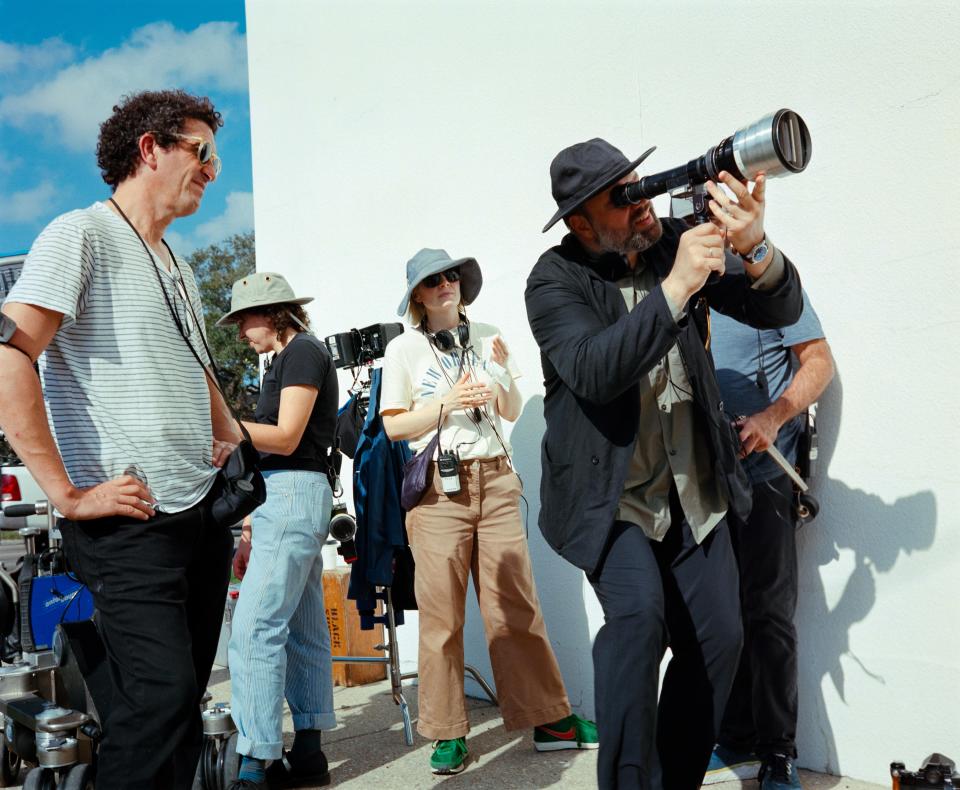
KINDS OF KINDNESS 02 JIMA STILLS
On first meetings
Anyone who expects Lanthimos to be as off-putting as some of his work will be surprised.
Emma Stone (The Favourite, Poor Things, Kinds of Kindness, Bleat, and the upcoming Bugonia): We met almost two years before we made The Favourite, so I had dinner with him and had spent time with him. I liked him a lot as a person. Truly the biggest thing is the material that he's drawn to and the way he goes about it. I like all the same stuff, and it was just like, this is amazing to do something that I really love and am challenged by and am interested in, but also to have it be an experience that's fun and lively.
Olivia Colman (The Lobster and The Favourite): He came to my home in London to meet me for The Lobster. He was very calm, and gentle and he wanted to meet people for the film. He was interested in casting against type. I said “Please tell me that she gets away at the end of Dogtooth!” He rolled his eyes and said “Why does everyone ask that?” Thought I'd blown it.
Jesse Plemons (Kinds of Kindness and the upcoming Bugonia): I'm always curious to ask writer-directors what was the initial seed of the idea. And I told him, “You don't have to answer if you don't want to,” but surprisingly, he did. First off, he said that he was inspired by Camus's "Caligula" for the first [story], and was thinking how to tell a similar story about absolute control in a modern way. And then him and Efthimis had this idea to do a triptych…That first conversation was almost unsettlingly casual, considering the script.
Rachel Weisz (The Lobster and The Favourite): We met in a pub in Camden Town. I had seen Dogtooth — an incredible film — and I really wanted to work with him. He told me he was writing a script in English and it turned out to be The Lobster. He was funny and mysterious and we had a cup of tea.
Yorgos Mavropsaridis a.k.a. Blackfish (Editor, all films): I worked on his first commercial. I did from the beginning notice his devotion to what he was doing… The way he wanted to do his things was completely different and was very personal. He was trying to have the final cut even in the commercials. Of course that would not be possible.

KINDS OF KINDNESS 02 JIMA STILLS
On rehearsal
Among his actors, he is known for a rehearsal process that involves exercises reminiscent of an improv class.
Colman: He works with actors by gaining trust, I think, through a rehearsal process, which for The Favourite was a series of theater games. We had run through the whole film so many times by the time we got to day one of the shoot. But we'd run it talking gibberish, or with grunts, or just the 'intention' of the scene. We shook off how we had done things up to that point, got rid of our inhibitions and preconceptions. We laughed, mucked about, talked, socialized, really trusted each other, and Yorgos. By the end, we would probably have followed him into battle.
Stone: The one that sticks out to me the most on Poor Things was he played a classical song, kind of operatic, and we each had to do four minutes solo up in front of everybody moving from one position to another—like a first pose to a second pose in the four minutes. You had to do it completely in slow motion for four minutes and then you had to do it completely backwards remembering what you had done before, like undoing the movement. That was like, Oh God, everyone's sitting and watching you. But you really can't feel self-conscious around these people after this happens because you're already in this state [where] everyone's a little embarrassed, everyone thinks it's funny, and then you're not embarrassed anymore. You're like, Okay, this is just what we're doing.
Mamoudou Athie (Kinds of Kindness): We were working on the text in very body-forward ways. The one thing that I remember the most is Jesse and I doing a scene as, like, Monty Python characters. We were doing the 'funny walks.' We were doing one of the scenes in which we were playing cops and we were doing those walks as we were reading it off the page. It was like, Man, this is wild.
Willem Dafoe (Poor Things and Kinds of Kindness): I've been a theater actor for many many years, and particularly when starting out, I knew versions of some of these games very much, and I thought, Oh, really, we're going to do that? But they were fantastic, because of the quality of the people and the quality of the direction.
Angeliki Papoulia (Dogtooth, Alps, and The Lobster): [For Dogtooth], the idea was to improvise invented games that the siblings would play in the house. So in the rehearsals many many times we were trying to improvise new strange games that the siblings would play in the house.
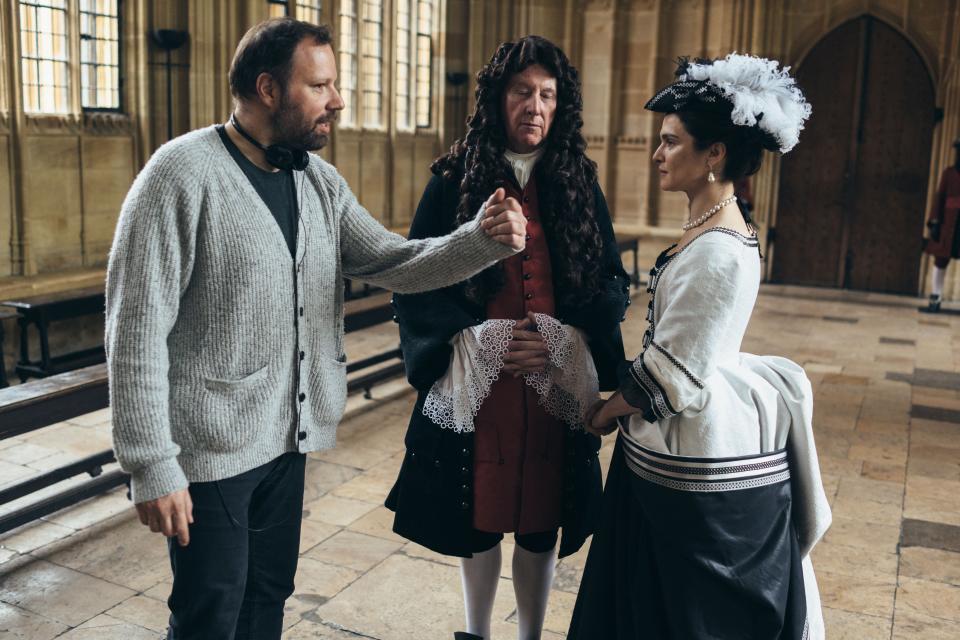
MCDFAVO EC035
On what it all means
Lanthimos leaves it to audiences to debate the mysteries of his work. Even his actors aren't let in on most of the secrets.
Joe Alwyn (The Favourite and Kinds of Kindness): There isn’t any major conversation about character, motivation, themes, intentions. [On Kinds of Kindness] there was a little dialogue about each of the three roles when they were put together with costume choices and hair and make-up, determining their look. But beyond that you play around on the day and he steers you in quite a technical way. “Let’s try the pace of it faster… slower… more awkward…”
Dafoe: I'm a good actor for him. I play the scenes, I find the actions, I don't think so much. I think about stuff happening to me and having an experience and learning something. I don't think so much about crafting a performance. If that sounds cold or impersonal it's not at all. In fact, it puts it out there in a way that puts you in a state of freefall and to field impulses. I think he's very good at having actors put impulses out there and then shaping them. He doesn't tell you what to think or what to do, but at the same time he's very precise.
Plemons: If it comes down to script or character analysis, no. That's sort of disconcerting in the beginning and then you start to realize it's not like he's being withholding intentionally to torture you or leave you out on a limb. It's more, I think, he has this ability to write and adapt material that isn't necessarily one thing. He really is interested in not only what the audience brings to it but also the people involved.
Weisz: On the two films I worked on with Yorgos he did not explain anything to the actors about what the movies meant, or how he interpreted the story, which I think really helps an actor. You can't really chase an interpretation as an actor, and it's nice to just go on instinct without analyzing. It never crossed my mind to ask about the ending of The Lobster. That's not Yorgos's jam—which I like.
Papoulia: He has this ability, in a very subtle way, to make you understand what is correct and what is not correct fits to the film and doesn't fit. You get it but you don't get it logically you don't get it by explaining. What is very important and what is very nice is he creates a situation where you can liberate yourself, where you can dive into this artistic universe without judging yourself at all.
Blackfish: When he wants to tell me that this is not good, he just says, This is very descriptive.
Stone: I think the elements of control are in every thing he's ever done. That's I think an obsession of his and something very interesting to him—human nature and the kinds of agreements we make about socialization and what we're supposed to be. Who's in charge? Do we want to be in charge of ourselves or do we want someone else to be? What does it mean to be loved? These are all these abstract, strange, surrealistic depictions, these things that are very human and affect us all.
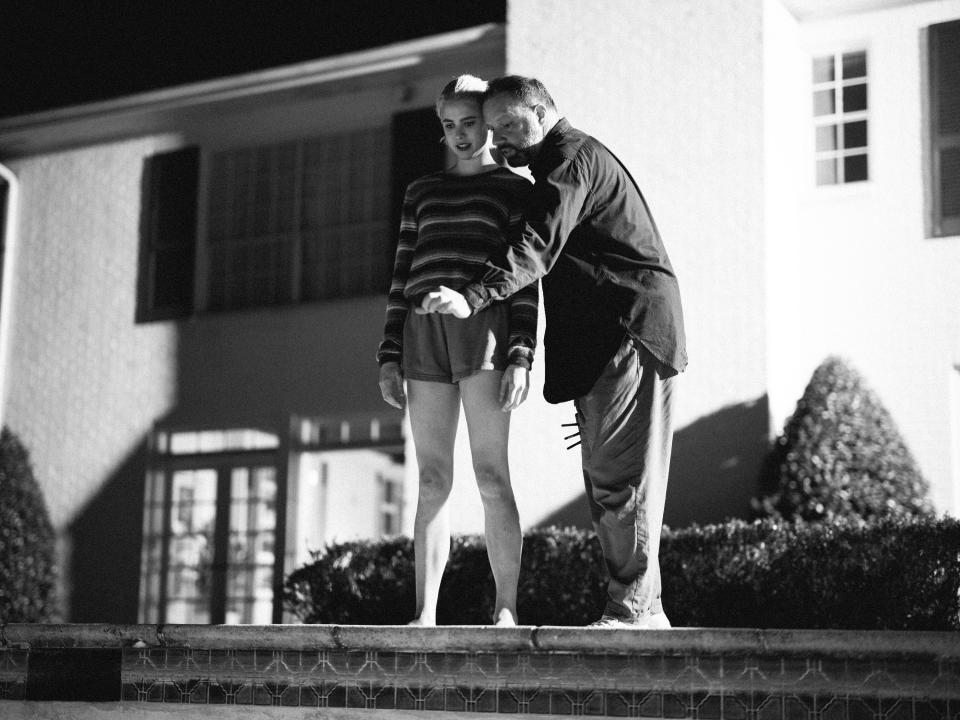
MCDKIOF H4034
On set
Lanthimos is incredibly straightforward with his coworkers, but leaves room for discovery.
Stone: He definitely gets to know kind of what makes each person tick a little bit and he uses that for them. Everyone is not treated differently but spoken to differently and he's a man of few words when it comes to the notes process…He does like to do impressions of me, which drive me fucking up a wall. Like in a funny way, but he's like, "I think we should slow this one down because the last one you were like”—[Stone does an impression of Emma Stone speaking really fast.] I'm like, "You don't have to do the impression. Like, this is so annoying, I get it. Thank you. I'll slow it down. Whatever."
Colman: He won’t blow smoke up your ass, which I love. He's gentle, and calm, he will never pretend, his approval is completely real when you get it, and that feels amazing. He will also not pretend if it’s not what he wanted. He’s honest. That is a really beautiful trait. There’s no second guessing. A dream.
Dafoe: He teases me a lot. Sometimes if I do something where, I guess, I'm self-conscious, or I lean into some bag of tricks he says, “Uh-oh. You did a Willem.” He's making of fun of me that I have certain things I do. But it keeps you honest, and he does it in a playful way. [And] he's usually very correct, because sometimes when you're lost you lean into something that's familiar.
Robbie Ryan (Cinematographer, The Favourite, Poor Things, and Kinds of Kindness): He likes some of the personality I bring to the camera, which is usually bad operating. "We'll go for the Robbie Wobble." You're like, "Okay, thanks."
"One more for Robbie" is what he usually says, because I've got something wrong somewhere.
Plemons: We shot this bathroom sequence in the first [segment], where I played Robert. We had done a bigger scene before that and I somehow completely overlooked that we had this other bathroom shot, where Robert goes and puts water on his face. This is maybe two and half weeks in or so, and, because of the environment that he created, I just sort of had an idea in the moment. I cannot tell you exactly what this idea was, but looking at this bathroom as something maybe less literal. And I did a take, expecting him to say something. And then next take I did something different and then the next take I did something different. And I went out and I was like, "Unless you give me something I'm just going to keep messing around." He was like, "Well, I'm not going to."
Weisz: On The Favourite, I got rather sentimental acting opposite the character [of] my husband, played by Mark Gatiss, who was going off to war, and Yorgos said, "Rachel. You are Sarah!” It made me laugh, because I knew what he meant—that I had gone off-piste and wasn’t being true to my character. She wasn’t a sentimental gal. It was minimal, funny and precise.
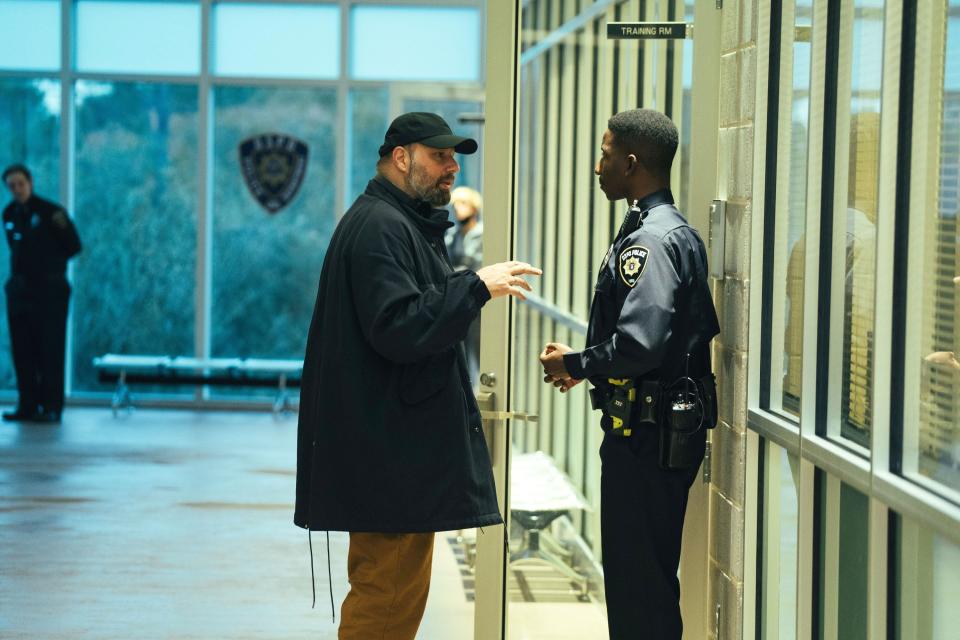
MCDKIOF H4035
On the violence (and the sex)
Even when the material is at its darkest—and Kinds of Kindness gets pretty, pretty dark—Lanthimos remains a pretty chill guy, according to his collaborators.
Stone: It's weird because the subject matter obviously is so intense in those moments [in Kinds of Kindness], but the feeling of the set doesn't really change, because it's such a contained environment and because everybody, a lot of times, has typically worked together before and trusts each other. I think it would be very different in a different environment, I obviously would be probably sinking into that intensity much more, but we're able to keep it moving without becoming too overwhelming or that feeling that you just have naturally with people that you don't know very well of needing to protect yourself or be on the lookout, whatever that might be. That doesn't really exist as much because we all know each other so well.
Alwyn: As is often the way in his films, characters go to uncomfortable places and experience uncomfortable things. I think in this instance, even though the material is dark, you just want to be with people that you know, respect and totally trust. That’s the main thing. Which, luckily, is the case with both Yorgos and Emily. It’s a pretty small crew on set (which helps), and he always tends to keep things light. And I think you can feel that in the tone of his work: even in the darkest corners he often finds humor.
Papoulia: [The violence] is also a physical act. Dancing or beating someone or being beaten, it has to do again with the body. It's not easy, technically. But I also I liked the fact that you can also express yourself through violent actions.
Athie: The sex scene—it's so boring to talk about because it's like, man, whatever. I wasn't sure [about it]. But, again, when you trust someone you know you're not going to feel like you're going to be taken advantage of and I didn't. And also we had conversations about things we were uncomfortable about. It wasn't like “You're going to do this, just do it.” We talked about it and there was a lot of respect involved.
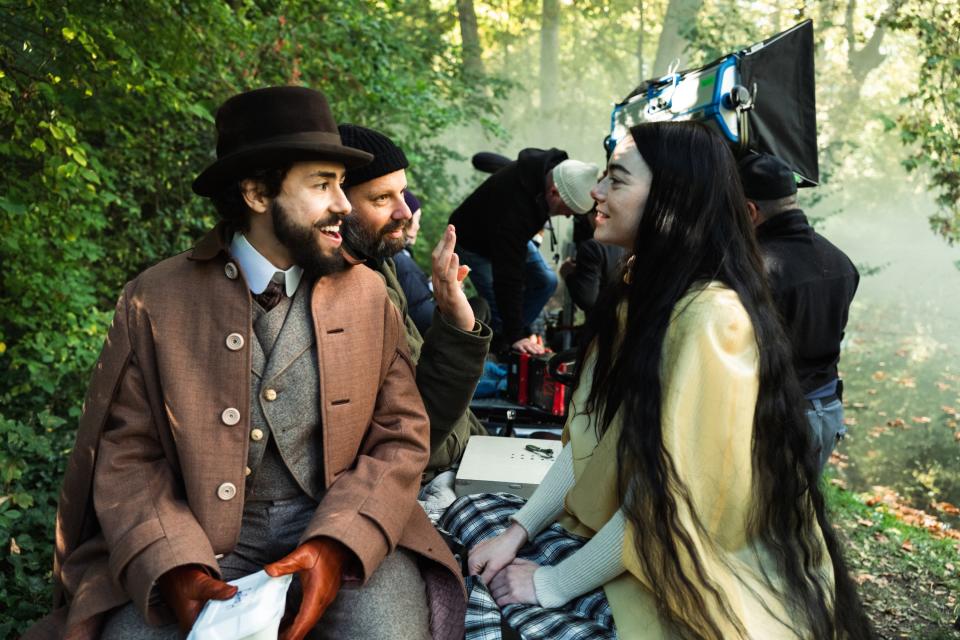
MCDPOTH H4054
On collaboration with Emma Stone
Though Lanthimos likes to work with the same actors across multiple projects, he and Stone have become joined at the hip. She'll appear in the director's next project Bugonia with Plemons, who has now entered the repertory as well.
Colman: I particularly watched he and Em really see eye to eye. Em would be so interested in which lens was being used, and his process. They got on so well, it made perfect sense that they would work together again. And my God, what work they've done.
Ryan: Emma's first day on The Favourite, she was a bit like me—we were all very new to his style. The camera was at a very very low angle and looking up at her making a cup of tea and then we followed her to where she gave a cup of tea to the Queen. Emma just looked down at the camera and how low it was and was like, "Oh it's going to be that kind of movie." What's great about her is that she's so adventurous and brave in whatever he challenges her to do, or asks her to do, that I think that was the beginning of a beautiful relationship.
Alywn: It’s a great feeling to work with the same faces—Yorgos, Emily, Robbie and more. It creates a feeling of trust. Familiarity and trust. Everyone feels excited to be on set. You feel liberated by the bizarreness of the material, but also grounded in having people around you that you know well, respect and get along with. It’s also just pure fun and play, right from the start, right from the rehearsal.
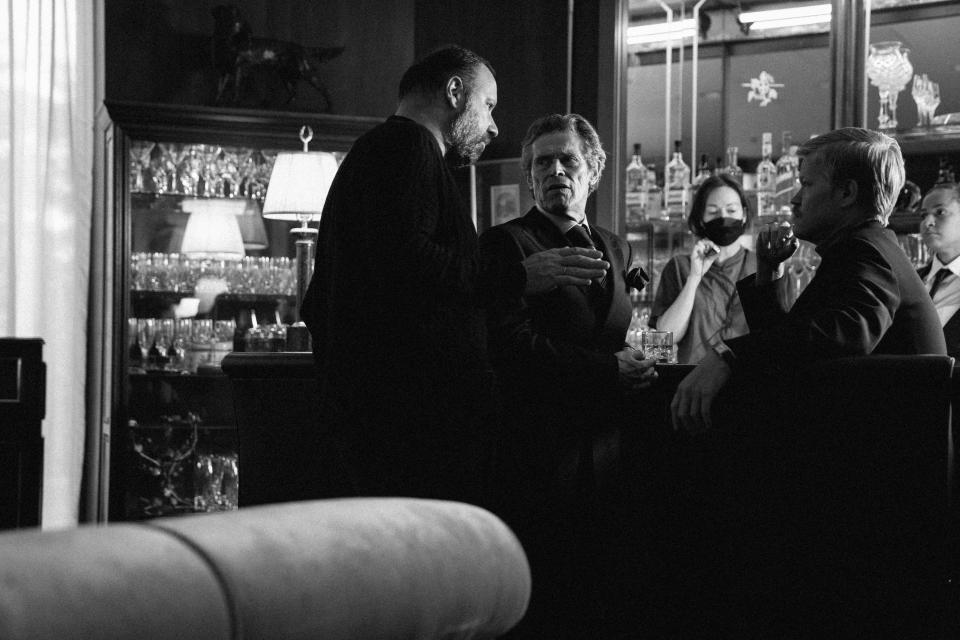
KINDS OF KINDNESS 02 JIMA STILLS
On success
Has international success changed Lanthimos? Not really.
Blackfish: We joke about it, saying, We do the same things, but now we get paid. Because then we didn't get paid. We try to keep it family.
Papoulia: It is very nice to see that he keeps developing himself artistically and at the same time globally, as a very well known global director. For me it's very touching. I admire him a lot and I'm very happy and proud for him.
Stone: He's still miserable. [Laughs.] I haven't seen him change. He asks why everything costs so much. Like, "Why does it cost so much to make this movie? We made Dogtooth for like a shoelace." When it comes to the studio system, especially the American studio system, it's just obviously a different beast. It's just general questions like, "I don't get it. What is going on in America?" Personality-wise, he's pretty much the same, just equally like, "This is a fucking disaster."

KINDS OF KINDNESS 02 JIMA STILLS
Atsushi NishijimaOn the court
Before he was a director, he was a hooper in Athens playing for Pagrati BC. Does he still ball?
Stone: He found out a couple of years ago that he broke a vertebrae while he was playing basketball as a teenager, and he never knew that the vertebrae was broken, so he has these back issues from when he was playing. But he's absolutely obsessed. We watch EuroLeague all the time. We went to a game in Athens for Olympiacos and we were just at the Greek championships all last week in London. He loves basketball and loves EuroLeague.
Originally Appeared on GQ

